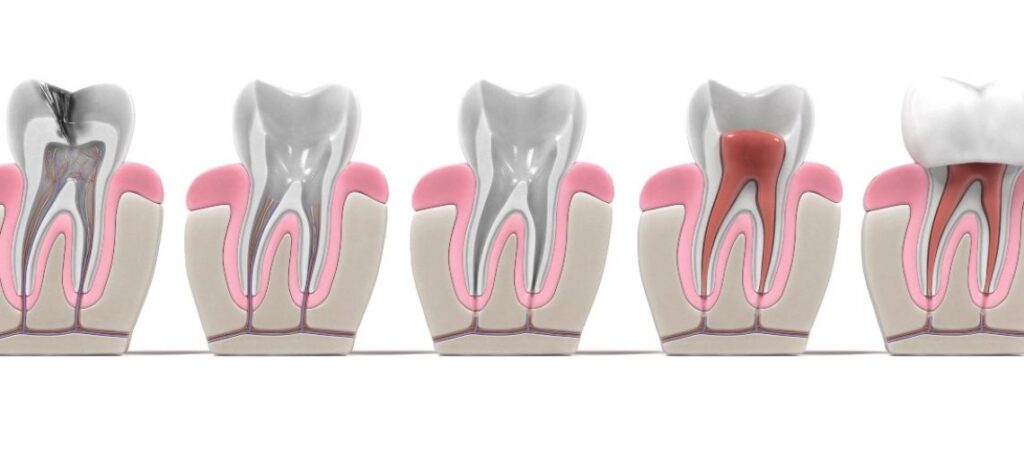
Imagine you have a toothache that won’t go away. You visit your dentist, who tells you you need a root canal. A root canal is a procedure that involves removing the infected or damaged part of your tooth and filling it with a particular material. The goal is to save your tooth and get rid of the pain.
But what if the pain doesn’t go away? What if it gets worse? What if you notice swelling, pus, or a bad taste in your mouth? These are signs that your root canal has failed. A failed root canal means that the infection or damage in your tooth has not been eliminated or has returned. This can lead to severe complications like bone loss, abscesses, or systemic infections.
A failed root canal can happen for various reasons. Sometimes it’s because the dentist made a mistake during the procedure, such as leaving some pulp tissue or bacteria inside the tooth or not sealing it properly. Sometimes it’s because the tooth has a complex anatomy, such as multiple canals or curved roots, that makes it hard to clean and fill.
Learn should dentist pay for failed root canal
The issue of whether dentists should pay for failed root canals has been a controversial topic in the dental industry for several years. On the one hand, patients argue that dentists should be responsible for providing quality care and ensuring successful outcomes. In their view, if a root canal fails, the dentist should bear the cost of retreatment or any additional work required to correct the issue.
On the other hand, some dentists argue that root canals are a complex procedure with inherent risks, and outcomes cannot always be guaranteed. In their view, patients may have contributed to the failure of the root canal due to poor oral hygiene or failure to follow post-treatment instructions. Additionally, dental insurance policies often need to cover the cost of retreatment for failed root canals, which can create financial challenges for dentists who may already be operating on narrow profit margins.
When a root canal treatment fails, it can cause a lot of pain, frustration, and expense for the patient. But who should bear the cost of fixing the problem? Some people argue that the dentist who performed the root canal should pay for the failed treatment, and here are some of their reasons:
The dentist breached the standard of care
If the dentist did not follow the proper protocol, technique, or guidelines for performing a root canal, they failed to meet the expected level of care and competence that a reasonable dentist would provide. This could include missing a canal, leaving an infection behind, or damaging the tooth or surrounding tissue. In this case, the dentist should be held accountable for their negligence and pay for the consequences.
The dentist did not inform the patient of the risks
If the dentist did not disclose the potential complications, outcomes, or alternatives of the root canal treatment, they violated the patient’s right to informed consent. This could include not explaining the possibility of failure, recurrence, or extraction or not offering other options such as antibiotics, fillings, or implants. The dentist should be liable for their omission and pay for the damages in this case.
The dentist caused harm to the patient
If the dentist did not provide adequate pain relief, infection control, or aftercare instructions during and after the root canal treatment, then they caused harm to the patient’s health and well-being. This could include not using enough anesthesia, not sterilizing the instruments, or not advising the patient on preventing further problems. In this case, the dentist should be responsible for their misconduct and pay for the remedies.

Some people argue that the dentist who performed the root canal should not pay for the failed treatment, and here are some of their reasons:
The dentist did the best they could
If the dentist followed the proper protocol, technique, and guidelines for performing a root canal, then they did everything in their power and skill to save the tooth and eliminate the infection. Root canal failure is sometimes due to factors beyond the dentist’s control, such as complex anatomy, resistant bacteria, or patient non-compliance. In this case, the dentist should not be blamed for their misfortune and pay for the outcome.
The dentist informed the patient of the risks
If the dentist disclosed the potential complications, outcomes, and alternatives of the root canal treatment, then they respected the patient’s right to informed consent. This could include explaining the possibility of failure, recurrence, or extraction and offering other options such as antibiotics, fillings, or implants. In this case, the dentist should not be liable for their honesty and pay for the damages.
The dentist did not harm the patient
If the dentist provided adequate pain relief, infection control, and aftercare instructions during and after the root canal treatment, then they did not cause harm to the patient’s health and well-being. This could include using enough anesthesia, sterilizing the instruments, and advising the patient to prevent further problems. In this case, the dentist should not be responsible for their conduct and pay for the remedies.`

What to do if a root canal is failed
Whatever the reason, a failed root canal is not something to ignore. It can cause severe pain and damage your oral health and overall well-being. If you suspect your root canal has failed, you should see your dentist immediately. They will examine your tooth and determine the best course of action. Depending on the situation, they may recommend redoing the root canal, performing an apicoectomy (a surgical procedure that removes the tip of the root), or extracting the tooth.
A failed root canal can be a frustrating and scary experience, but it doesn’t have to be the end of your smile. Proper diagnosis and treatment can restore your oral health and enjoy a pain-free life.
FAQs
Conclusion
Root canal treatment is a common and effective way to save a tooth from infection or damage. However, sometimes it can fail and cause pain, infection, or tooth loss. The question of who should pay for a failed root canal is not easy to answer, as it depends on the cause of the failure and the circumstances of the case.
Some argue that the dentist who performed the root canal should pay for the failed root canal treatment, as they may have been negligent, uninformed, or harmful. Others argue that the dentist who performed the root canal should not pay for the failed treatment, as they may have been competent, honest, and careful.
Ultimately, the best way to resolve this issue is to consult the dentist and discuss the options for fixing the problem. If the dentist is willing to admit their fault and offer a redo or refund, then the patient may accept the offer. If the dentist is unwilling to admit their fault or offer a redo or refund, the patient may seek legal advice and pursue a compensation claim.

